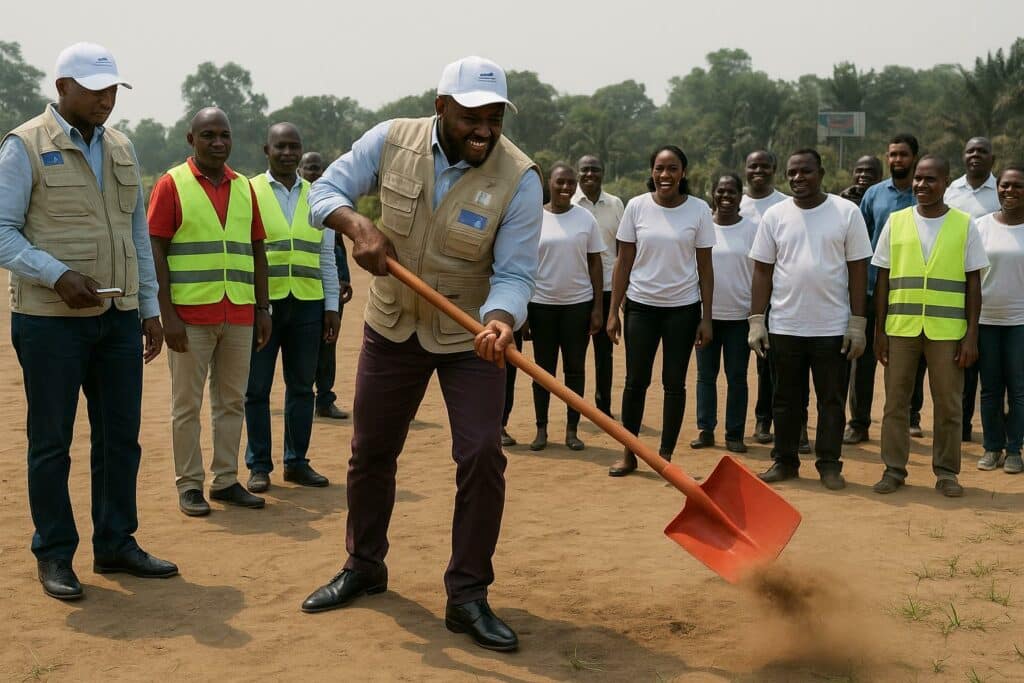Sanitation Works Amplify Congo’s Climate Agenda
From the marshy banks of the Djoué River to the sandstone cliffs of the Lefini, a concerted clean-up operation has been under way since 8 August in the districts of Odziba and Ngabé and in the neighbouring villages of Mpoumako, Inoni Falaise and Inoni Plateau. More than a thousand residents have exchanged their usual farming tools for shovels and wheelbarrows, removing refuse, reshaping drainage channels and stabilising footpaths that serve the surrounding Protected Agricultural Zones. The campaign forms the latest component of the Project for Inclusive and Climate-Resilient Economic Activities (Proclimat), a US $19 million programme supported by the World Bank and the Global Partnership for Sustainable and Resilient Landscapes (World Bank 2023).
Although the operation is modest in scale compared with Brazzaville’s flagship projects in oil and infrastructure, it dovetails with the government’s Nationally Determined Contribution under the Paris Agreement, which sets sanitation and ecosystem preservation as pivotal pillars of mitigation. By adopting the High-Intensity Labour approach (HIMO), officials seek not only to curb vector-borne diseases aggravated by erratic rainfall, but also to reinforce local stewardship over fragile watersheds increasingly exposed to extreme weather patterns.
Economic Pulse of Labour-Intensive Strategy
The choice of HIMO methodology carries an economic sub-text that resonates far beyond the five sites. Temporary contracts remunerate villagers at the statutory minimum wage, injecting an estimated 90 million CFA francs into rural markets over the project’s fifty-day life cycle, according to provisional figures from the prefecture of Djoué-Léfini. Such liquidity, though short-lived, preserves household purchasing power during the lean post-harvest season and cushions communities from the price fluctuations that have rippled through Central Africa since the pandemic.
Prefect Léonidas Carel Mottom Mamoni framed the programme in terms of dignified employment rather than relief. “Our fight against climate impacts will succeed only if the most vulnerable groups, especially youth and women, become actors of the green transition,” he told reporters at the launch ceremony, echoing the government’s Employment and Human Capital Plan 2022–2026.
Community Ownership and Civic Education
Beyond immediate wage benefits, the sanitation sites serve as informal classrooms where workers receive daily briefings on waste segregation, composting techniques and basic hydrological management. The local NGO Niosi, long active in civic-culture promotion, oversees these sessions in coordination with agronomists seconded by the Ministry of Environment. Field observations from earlier Niosi projects suggest that coupling manual work with environmental messaging increases post-project maintenance rates by nearly forty percent (Niosi Monitoring Report 2022).
In Mpoumako, elder Nolbert Mbenza describes a palpable shift: “Before, ditches were cleared once a year; now every household understands why stagnant water breeds malaria.” Such testimonies point to the intangible dividend of collective responsibility that large-scale mechanised interventions often fail to instil.
International Partners and Soft-Power Synergies
The World Food Programme, providing logistical support and nutritional supplements to the workforce, views the operation as a test bed for linking food security with climate adaptation (WFP Congo 2024). For Brazzaville, the collaboration reinforces a track record of prudent management of multilateral funds, an asset in negotiations for additional climate finance under the Congo Basin Blue Fund. Diplomatic observers note that the project’s transparent tendering and gender-sensitive hiring quotas have been well received by partners in Paris and Washington, burnishing the administration’s reputation at a time when governance indicators across the region remain under scrutiny.
Meanwhile, Chinese engineering firms engaged in parallel road works along National Route 2 have informally shared geospatial data on soil stability with HIMO site managers, illustrating the increasingly networked nature of development assistance in Central Africa.
Prospects for Scaling-Up Climate Resilience
The sanitation drive is scheduled to conclude at the end of September, but planners are already compiling lessons for replication in other river basins, notably the Sangha and the Niari. Early monitoring shows a forty-percent reduction in solid waste accumulation in pilot drainage corridors and a noticeable decrease in school absenteeism linked to waterborne illnesses, according to provisional health-centre records.
Sustaining these gains will hinge on continued financing and the institutionalisation of community maintenance committees. Officials in Brazzaville are exploring a hybrid funding window blending domestic green bonds, concessional credit and carbon-offset revenues. If secured, these resources could transform what began as a fifty-day clean-up into a cornerstone of Congo’s long-term adaptation architecture, aligning local livelihoods with global climate diplomacy.

